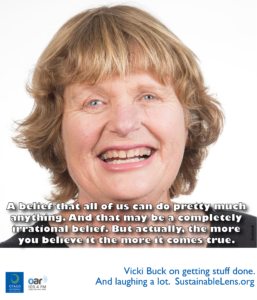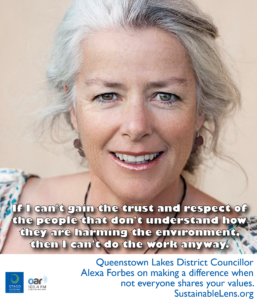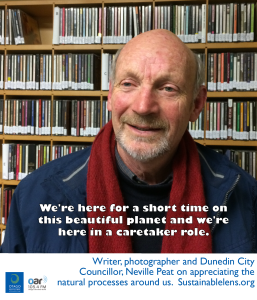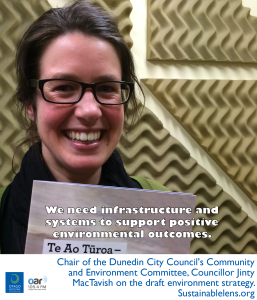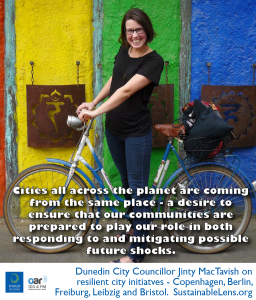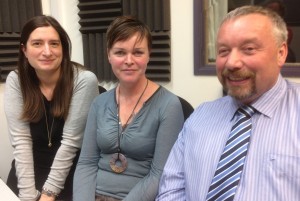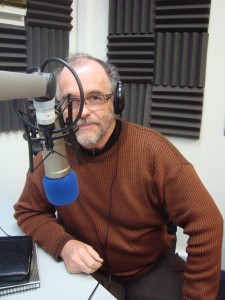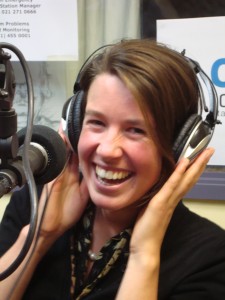| Samuel Mann: |
Tonight’s sustainable lens is Vicki Buck who is the chair of the Innovation and Sustainability committee of the Christchurch City Council. Thank you for joining me.
|
| Vicki Buck: |
Thank you for having me.
|
| Samuel Mann: |
Where’d you grow up?
|
| Vicki Buck: |
Christchurch, in this town.
|
| Samuel Mann: |
What did you want to be when you grew up?
|
| Vicki Buck: |
I wanted to be a teacher and then, when I got to high school, I thought that’s a really dumb idea. So I didn’t want to be a teacher at all. I actually saw an interview on TV when I was at high school from somebody calling themselves the political scientist, a guy I know actually, and thought, “That’s a really good job. I’d like to be one of those.” Not having a clue what they did. I was really interested in languages, I loved languages, so thought I might go and study them. Got some of it [inaudible 00:01:20] but I really liked the politics. And, yeah, ended up I still don’t really know what I want to be. So I’m kind of thinking that when I grow up, I’ll know. But as yet I haven’t a clue.
|
|
I know I like doing things that I enjoy doing and probably largely unemployable, actually. So I kind of have to go and set up my own companies and do just stuff that’s fun. I can’t see the point of doing it if I’m not enjoying it and having a really good time. So that takes us into all sorts of paths.
|
| Samuel Mann: |
But you’ve been in local government since you were a teenager.
|
| Vicki Buck: |
No. I first stood for council when I was 18, 19, so I was elected when I was 19 and stayed in that for a long time. It was a very part-time thing at that time and you got paid, I think, about $260 a year max. So it wasn’t something that you did as a job. I had to have a job that paid the rent and everything as well. Much later when I was 30 something, 33, 34, I became mayor. So I had been in local government a long time. I got out of it completely after I finished being there. I had no intention of coming back. It was only because I was kind of annoyed at what was happening to the Christchurch area that I came back.
|
|
And so have been involved in kind of a whole lot of things. Got involved in education because I’d kind of thought that there needed to be some changes and thought, you know, it’d take three weeks to do. I ended up there for about 10 or 15 years. I’m not a teacher. Got involved in a whole pile of climate change stuff that involved sort of deriving fuel from algae and all those sorts of things. And I’m not a scientist either. So I kind of figure I haven’t got any real skills so I just had to play across all of the areas, yeah.
|
| Samuel Mann: |
When you left politics the first time, or perhaps it was the second time-
|
| Vicki Buck: |
First time.
|
| Samuel Mann: |
First time. Off into education despite not being a teacher?
|
| Vicki Buck: |
What I wanted to do was … The bit that excited me was just kids learning around stuff that they love. What excited them. My own son went off to school and was bored completely, so he would deliberately get kicked out of classrooms at age five because he was annoyed with the teacher interfering with his thought process. He was interesting at school. A pain in the neck, I would have thought. I wasn’t keen to do home schooling because I wanted to be doing a whole pile of other things as well. So I thought, well, okay, so we need a different type of schooling because clearly this is not working. And because I’d actually enjoyed school, I didn’t realise how many kids it wasn’t working for.
|
|
We then discovered, amazingly in a meeting with the Ministry of Education, that there’s a lovely, lovely section in the Education Act, section 156, that enables parents within the state system – because I like the state system, I like the idea that everybody has the same options – that within that, if you don’t like the style of education you’re getting that actually a group of you can go and set up a whole new system within the state system. Well, a brilliant little piece of law. And so, well, we decided we would do that. Ironically and not surprisingly, I suppose, the Minister of Education, who was then that guy Smith. What was his name? He was on TV … forgotten his name.
|
| Samuel Mann: |
Lockwood.
|
| Vicki Buck: |
Lockwood Smith. That one. He hadn’t thought about the possibility either and so later on Wyatt Creech became Minister of Education and he was way more open to the concept of innovation because, I think … Actually, many politicians, I think, come in wanting to do things and then find that they’re kind of held back by here are the rules, here are the regulations. We’re going to take you through this journey that’s going to take you many years of your life. And actually that’s not what they came in to do. They came in to change things and to try things. So he was amazingly helpful. It still took a long time to get through the ministry. And so we discovered that we could actually do it.
|
|
And, yep, they finally approved it and so we were allowed to start Discovery One, which was still based on a state school so it was free. Based on kids learning around what excited them. If you learn around what excites you, first of all you’re going to probably like learning. Because I think we come into the world being naturally curious and excited about possibilities, and then we gradually get that ground out of us. So like “these are the things that you need to know” and “this is what you need to know for NCEA”, so that’s going to be the be all and end all, and there’s never going to be any technological gains or disruptive technologies or innovation of any sort whatsoever.
|
|
So I think the really key thing is, one that kids love learning, two that they learn how they do learn and that they have fun along the way. When we wrote the submission I had to take the F word, the fun word, out of the submission to the Ministry of Education. It was not allowed to be included so I had to go and delete it all along the way. People who did know about education helped enormously in the process of doing that. There was about six of us involved in that. So we finally got this up and running. And then, from my own selfish point of view, my son got there just in time, for a year or so, before high school. And so then we had to create a secondary school as well, because otherwise our local school was going to be boy’s mayhem. That was completely unfair on boys I had to do that to them.
|
|
So we created Unlimited. Actually, we created it in about 10 weeks from the approval to the start of the term, which was way fun because it meant during the holidays we were in there with the plumber and doing all sorts of things that were just, you know, these are the things that you have to do. So a lot of fun. I had enormous fun with both of them. I haven’t been involved with either of them for about four years but we may merge the two. But, yeah, I thoroughly enjoyed just the incredible energy and drive and passion that goes with young people and what they want to do. And the opportunities to learn that are just so widespread and so ubiquitous that it’s mind-blowing. So, yep, that was incredibly good fun.
|
|
So I think in many ways, as a parent or as a member of the community, we’re all educators. We’re just not recognised as teachers. I’m cool with that. I have no desire to sort of be a teacher or anything. We got to the end of Unlimited and thought, “Hmm, the university system.” But that’s quite controlled in New Zealand so you have to be really tolerant for that.
|
| Samuel Mann: |
So you haven’t taken them on?
|
| Vicki Buck: |
I haven’t taken on the university system, no. Actually, in many ways the university system has, especially – I mean, I work most closely with the University of Canterbury here – has adapted quite a lot. Especially post-earthquake with the student army, with their engagement with what they want the kids to achieve and with their emphasis on community involvement and active internships and all sorts of things. So it’s been great to see that happening. So, no, we haven’t established a university.
|
| Samuel Mann: |
So now back on council?
|
| Vicki Buck: |
Yep. I came back on three and a half years ago when I got a bit annoyed about what was happening in Christchurch and what wasn’t happening, and the opportunities that you could see everywhere that perhaps weren’t being taken advantage of. And just what happened post-earthquake was this amazing energy. There was no-one in control for such a long period of time, or it felt like there was no-one in control, so you just had to do stuff. If you wanted things to happen, nobody was going to do it for you. You just had to do it. And all throughout the city, over and over again, you see people doing stuff that they probably didn’t even know that they could do, just because they had to start doing it.
|
| Samuel Mann: |
So other than the matter of the devastation and so on, it was your dream come true?
|
| Vicki Buck: |
No, I would never have gotten about it that way. I would prefer to have stayed out of politics, actually. There were lots and lots of things that I found … Like, so I was working in climate change technologies, all of which I love, and the climate change website.
|
| Samuel Mann: |
With Nick Gerritsen?
|
| Vicki Buck: |
Yep, and with a range of other people on all sorts of things and on windfarms and stuff, which I was still involved with till a couple of years ago. So there are amazing, amazing possibilities. So the whole thing about sustainability strikes me as the most pressing issue that we have. We don’t really have a Plan B. We have one planet that we’re fast destroying and, you know, even looking forward, never mind my children’s or their children’s lifetime, this will happen in my lifetime. And you can see it with water happening all around. You know, the need to create so-called economic development by taking as much water as you possibly can for intensive dairying. It strikes me as crazy when you’ve got this incredible resource that is going to be one of the scarcest resources in the world and the most important. So water and food and clean air and those valuable commodities that – not commodities, because they’re not commodities, they’re way above commodities – that you just need to treasure. We haven’t and we so need to.
|
|
So just from a “what is really important” sustainability and just the awareness of climate change and what we’re not doing and what we could do. I mean, I see it as almost … it’s one of the huge issues of our time. Yep, I can’t ignore it.
|
| Samuel Mann: |
Where did it come from, that passion or knowledge in you?
|
| Vicki Buck: |
It seems to me that it’s self-evident that if you live on a planet that you don’t stuff it up. That you’re here for a relatively short period of time and what you do can make a difference. And if you don’t do that, then you’ve stolen from everybody else on the planet and you’ve defrauded the following generations. I don’t even know where it came from. It just seems so apparent, how can I not know that?
|
| Samuel Mann: |
Were you an environmentalist at school?
|
| Vicki Buck: |
I think I’ve always been an environmentalist. I don’t think I understood how rapid and dangerous climate change was to all of us, regardless of where we live, and how it affected people grossly unequally, till probably, I don’t know, 20, 30 years ago. Who knows? Who knows? It wasn’t last week and it probably wasn’t when I was nine so sometime in between.
|
| Samuel Mann: |
Somewhere between nine.
|
| Vicki Buck: |
Sometime in between nine and last week, yeah.
|
| Samuel Mann: |
I don’t know what sort of council you’ve got but is it hard work, are you pushing that up a hill on the council or the council gets that?
|
| Vicki Buck: |
This council and the previous one have actually been quite green in terms of their environmental concerns. So the awareness of climate change is very real. The importance of the quality of our water is felt strongly and the initiatives that we can take, like watch this space later this year for electric vehicle fleets. Entire compact vehicle fleets that we’ve been working on for a couple of years. We’ve got the autonomous electric vehicle out being trialled at the airport, which has been great fun. Those sort of changes that make possible quite different dimensions are fantastic.
|
|
We’re spending, probably over a five to seven year period, about 150 million on retrofitting the city and cycle lanes so that when you ride a bike you feel safe because you’re separated from the truck or the car. And I think for a lot of people that’s incredibly important. That makes me ride a bike as opposed to not ride a bike, if I feel safe. And I think that’s quite a different perception for women than men sometimes, and some of the research I’ve seen suggests that. But when you’ve got a city that’s already fitted out, retrofitting it with cycle lanes is an interesting process that requires a huge amount of public consultation. And you have to take the public along with you. So it’s not something you can do in 10 minutes but over a five to seven year period it will happen.
|
|
Obviously you’ll see in the central city that the speed limit is 30 ks, that the emphasis is on walking and cycling. We’ve just put some money on to extend our bike share so that it’s citywide, this one in the central city but it needs to go citywide as a means of public transport. So your helmet’s there, your bike’s there and you can leave it wherever at any of the other hubs.
|
|
Yeah, so there’s a … I mean, from our point of view, obviously insulation has been seriously important and one of the things, especially in a climate like this, one of the things we’ve been really, really wanting to do is to increase the building code standard. In the district plan we wanted to raise that to about six green star from the current building code, which we think would have added about $1700 to the cost of a building but ensured the wellbeing of children and their health and education and all sorts of things. The government, unfortunately, wouldn’t allow that to go through and the replacement district plan, it’s not there. So you win some and you lose some.
|
| Samuel Mann: |
In fact, in terms of wellbeing they went the other way.
|
| Vicki Buck: |
It’s the building code.
|
| Samuel Mann: |
But in terms of the wellbeing responsibility of council, they took-
|
| Vicki Buck: |
Yeah, slightly different. This is the district plan so we’ve had a very fast process of redoing the entire district plan. It’s not one I’d really recommend. But if you’re rebuilding a city and you’re rebuilding so many houses, you would think one of the most basic things is that you make sure they’re really well insulated, that the VIM envelope is really important, that you actually build them to a standard that guarantees that those kids are growing up in warm, dry houses, or those adults are living in warm, dry houses. Because you know the impact that that has on education outcomes, on housing outcomes. I mean, on health outcomes, everything. So not to be able to do that was infuriating. Annoying, to say the least.
|
| Samuel Mann: |
So as chair of Innovation and Sustainability-
|
| Vicki Buck: |
That’s just this term, so we’re having our first meeting next week, yep.
|
| Samuel Mann: |
Awesome.
|
| Vicki Buck: |
Yep, it’ll be good fun.
|
| Samuel Mann: |
So what’s the first thing on the agenda after-
|
| Vicki Buck: |
There’s a few things. Obviously one of the things that we do here in council is that we have an open session at the council that we started last time called Vox Pop. So anybody can come in with any issue whatsoever that has to do with the city and they get five minutes, and they’re allowed to talk directly to the councillors. So they’re all sitting there, it’s all live streamed, it’s all the media sitting there. Choong, here’s your issue. Make of it what you will. And that’s been wonderful but I think we need quite innovative ways of engaging people. I’d like to see someone involved in some waste minimization things. Obviously I’d like electric fleets, not only at the council but I’d like to see some trial bus routes. I’d like to see us get to the point where that autonomous vehicle was licenced to go on the road. We’ve done all the work on that and so we’re working with a range of research organisations and the HMI has been amazing on that.
|
|
So there are a whole raft of things. From our point of view, probably the transport fleet is the biggest carbon emitter, although probably the destruction of buildings and the rebuild has used way more than we would … I mean, our carbon footprint will have looked horrific in the last five years.
|
| Samuel Mann: |
I think that’s going to be the most important thing in terms of doing the transition to electric vehicles, is the big fleets.
|
| Vicki Buck: |
So do I, because if you and I want to buy an electric vehicle we’re probably buying a second-hand one. And to get a big supply of second-hand ones into the country, we want a range of things. We want the big companies to be buying them and so what we’re looking at is possibly with 10 other business and government agencies in the city, so it will make a huge difference to the city, just like that when it happens, which I love, those sort of things. But then when they sell the second-hand vehicles, then they become affordable for everybody else to buy. Because I think, although the running costs and they stack up incredibly well, I think that always with renewable technologies there’s that initial capital cost which is hard for people to get past.
|
| Samuel Mann: |
And it’ll normalise it and make it viable for things like mechanics to get training or whatever they need to do to get there.
|
| Vicki Buck: |
Yep. Actually, there’s so few moving parts I think the training will be … you could do it. You could do it as one of your courses.
|
| Samuel Mann: |
It all sounds so positive to me and so obvious.
|
| Vicki Buck: |
It sounds obvious to me too, so what’s the problem? I don’t actually see that there is a problem. I mean, it seems to me that any authority, whether it’s a council or a large business or a small business, has a responsibility to ensure that the environment that they live in is not made worse by them being there and is, in fact, improved by them being there. That seems self-evident to me. So I don’t see the problem either.
|
|
I think the other thing that’s always really important is the importance of what I see as the strength of Christchurch, is the 386,000 people who live here. And the brains and the thoughts and the talents that reside in those people. And I think quite often we tend to think of cities, you know, pipes and roads and footpaths and, you know. And those things, believe me, not having had them for a while, we love them.
|
|
But the really, really important part of any community is the people who live there. And so what you want to do, I think, is make sure that everybody feels that this is their community, that they have a really strong sense of belonging to this community. And that the things that they want to do that excites them, not just in education, not just at tertiary. But, I mean, they’re here for their whole life, or they’re here for 10 years, whichever, that period of time that they’re here, that that sense that they can do the things that they love doing. That anything is possible, so the byline I quite like for Christchurch is that anything is possible. And so that’s what we’re sort of working on. That’s got to be true for every age and you’ve got to maybe make sure that that works for people at certain … so it’s not just true if you’ve got a certain income level.
|
|
One of other areas that I’ve spent a lot of time on is housing which was, after the earthquake, really critical. Our housing policy spans from making sure there are no homeless, which is quite a good goal in itself, right thought to helping people into their first house, which we’re currently working with government. Touch wood. Not yet sorted. But those things are really, really important. I mean, people’s sense of belonging, it is way enhanced if they are living in a place that they feel is theirs, whether it’s a rental or ownership. And making sure that there aren’t people living on the streets who … Some people occasionally want that for a while. That’s fine, but if they don’t want that, that there are options for them.
|
|
We’ve done some things within the Mayor’s Welfare Fund, for example, where if we can’t within our own social housing, which we have 2300 of and which is now administered by ÅŒtautahi or Housing New Zealand, that we can actually provide the wherewithal for a private rental. I mean, one of the neat things about Christchurch at the moment is that houses are actually affordable. So I’m not sure if we should tell this, because I’m not sure how many Aucklanders we want here. No, I’m having them on. We actually like them. But, you know, if you’re looking at a million dollars house in Auckland, that’s really hard to come back from. You can buy a house here for, starting with a three, you know, three hundred and something. And you might need to do it up a wee bit but it’s very livable.
|
|
And that’s fantastic because you kind of have that affordability factor. For example, I was talking to a research group who were over here doing some research with the autonomous electric vehicle, which is on the Auckland campus, and the guys or the team were from Melbourne. They’d looked at the price of housing over there and they were in their late 20s, early 30s, and they were saying, “We’ve just looked at housing here. We want to relocate our research to here because we can actually afford to buy a house.” And at a million plus, you can’t. I can’t even imagine how much that mortgage must hurt. That’s revolting.
|
|
So there are cool things, I think, you can do within a city. And I think the key one is talent and the sense of possibility and excitement about living in that city, and the fact that your community is really important. You need to create those deliberate bumping spaces where you bump into people in the community, where you have a nice experience, where there’s events and you come away feeling good. Those are really, really important issues.
|
|
We’ve got some huge issues in Christchurch in terms of mental health, which is not ours but it’s not something you can turn your back on either. That’s like in education. We’re trying to get to the point where if you’re six or eight or 10, we can somehow make available to you all the learning opportunities that are there in the wider community. Not just at your school with your teacher. And in terms of the city itself, like the opportunities for learning through internships and some other some other sort of internships that we’ll create. It doesn’t exist yet.
|
| Samuel Mann: |
Okay, some questions to end with. What is your go-to definition of sustainability?
|
| Vicki Buck: |
Actually, it’s probably more than sustainability. It’s the fact that you actually leave the planet slightly better than when you came. It’s probably quite a personal one in that I can see my kids, for example, needing, and everybody else’s kids needing clean water, good air, the rivers actually running. I want them to be able to swim in rivers, not wade.
|
| Samuel Mann: |
And to have some water in them to start with.
|
| Vicki Buck: |
I’d like water in them. Yes, it would be novel. And I also think it’s sort of having some obligation to the other, not just people but the other species on the planet. In order to achieve your aims, do you have to completely screw other people? That doesn’t seem like a good idea. I mean, for that reason I can’t get the slightest bit excited about the concept of drilling for oil. It just seems like lunacy to me that you would even contemplate bringing out more oil into a world that cannot actually burn what we already know about without destroying the planet. So where’s the logic in this?
|
| Samuel Mann: |
But there’ll be people in your city that would see Lyttelton or wherever as being a suitable base for a drilling place, don’t you think?
|
| Vicki Buck: |
Actually, very few, I think. Very few people, I think, would see that because, apart from the Banks Peninsula Marine Mammal Sanctuary, we haven’t found much of the thing. And then the drilling part starts right next door, so apparently that oil knows, you know, this is the boundary. Never [crosstalk 00:27:37]
|
| Samuel Mann: |
Well, I wouldn’t go there, no.
|
| Vicki Buck: |
We won’t go there because, you know, there’s a big wall. Banks Peninsula, from our point of view, is just this amazing sort of natural wilderness area. And the sea off Banks Peninsula, and off all of our coastline, is so valuable to us that the idea of anything going wrong, that you can’t control, you’re in deep ocean water. You can imagine, there’s no capacity anywhere in New Zealand to deal with that spill. So wait a minute. We’d have to ring Singapore or China or wherever, or America, and find out where the nearest one is. Seven weeks away? Oh, we’ll just wait here patiently while you completely ruin one of the most amazing assets that New Zealand has. You know, its ocean.
|
|
No, I don’t think there’s many people that are … actually, I think they need a government. And, you know, even something like Brighton Beach, which for that community is so vital and so loved, that the idea of any sort of crappy oil spill coming up … not welcomed. But no, I can’t think of anybody, actually. I’m sure there are some.
|
| Samuel Mann: |
So what’s the biggest success you’ve had in the last couple of years?
|
| Vicki Buck: |
That’s a hard question. I think possibly changing our usage to electric vehicles will be. I hope. I’ll tell you that in a couple of weeks.
|
| Samuel Mann: |
We’re writing a book of these conversations. We’re calling it Tomorrow’s Heroes.
|
| Vicki Buck: |
Or yesterday’s.
|
| Samuel Mann: |
No, it’s as if we’re looking back and people like you will be the heroes that people will look back who are pleased that you’re doing this kind of work. So what’s your superpower? How do you describe your superpower?
|
| Vicki Buck: |
Probably optimism. Probably a belief that all of us can do, actually, pretty much anything. And that may be a completely irrational belief. But actually, the more you believe it the more it comes true, which is kind of weird. And probably the ability to laugh a lot. So when I do something completely insane, which is regularly, I’m not hugely distressed.
|
| Samuel Mann: |
Do you consider yourself to be an activist?
|
| Vicki Buck: |
Yes. Yes, I always have.
|
| Samuel Mann: |
Why?
|
| Vicki Buck: |
Because the opposite of that is being passive and it sounds so boring. I’ll just sit here passively and go through life. Like, jeez, I’ve only got one of them that I know of. You know, I’m willing to have more. But why wouldn’t you use everything you’ve got to make happen the things that you want to have happen. I can’t see any reason why you would do it any other way.
|
| Samuel Mann: |
What motivates you? What gets you out of bed in the morning?
|
| Vicki Buck: |
I just like the fact that you can make cool stuff happen. There was a lovely interview with somebody from the airport, and he said, “My job is to make cool shit happen.” I thought, “Oh, that’s my job description.” So, yeah, just making cool shit happen. I’ve stolen that from [inaudible 00:31:05].
|
| Samuel Mann: |
What’s the biggest challenge you’re looking forward to in the next couple of years?
|
| Vicki Buck: |
In the next couple of years? I don’t know. I don’t know. It could be different tomorrow from this day. It’s not like I can plan a couple of years ahead. About a week is good.
|
| Samuel Mann: |
Alright, take the time off then. What’s the biggest challenge you’re looking forward to?
|
| Vicki Buck: |
I don’t know. I like them all. I like the idea of completely altering the way we do education here. Which is nothing to do with council, really, but I don’t think anybody will notice for a while. I like the idea of some initiatives that people will come up with that we can help. I don’t think we have to do it all. Really, we’ll delegate it to anybody and everybody. There’s 386,000 of them out there. Â So, yeah, just the fact that … what excites me is that I know that today and tomorrow and the day after, people will come up with cool ideas.
|
|
We just put a thing on, on Facebook, about a community fridge. And three groups, like, I’d really like to see these. You know, people have got surplus food, just put it in a pantry or fridge and it’s available to anybody in the community who needs it. Three groups have come back and said, yeah, we’d like to do something about this. I just love the currency of ideas that people can make cool stuff happen all the time. Actually, the thing I’m probably looking forward to is getting back into our house which has been completely rebuilt, not as an insurance thing but as a leaky house. Which is not the way you want to do it but it’s going to, in theory, be a 10 star one, which will be a lot of fun.
|
| Samuel Mann: |
Awesome.
|
| Vicki Buck: |
Yeah.
|
| Samuel Mann: |
If you could wave a magic wand and have a miracle occur by tomorrow morning, what would you have happen?
|
| Vicki Buck: |
Actually, at the moment I’ve been watching that famine in South Sudan and Yemen, and watching those kids not have food. I can’t stand it. I can’t even watch it. And you feel kind of quite powerless about it, so my miracle would be that one … Well, actually, I’d like lots. But one that they’re fed and they get a chance to live their lives. Another one? Would it have something to do with Trump? Yeah.
|
| Samuel Mann: |
Are those the things that go beyond your optimism? Is everything achievable but there’s things outside that-
|
| Vicki Buck: |
[inaudible 00:33:56]. Really, what were you thinking? No, I tend to be optimistic anyway, so it’s kind of ingrained. I can’t get rid of it. Even after half an hour of Trump I can still get over it. Yeah, yeah, he does test it to the limit. He’s tests it completely. And his advisors, Sean Bannon particularly.
|
| Samuel Mann: |
Lastly then, do you have any advice for our listeners?
|
| Vicki Buck: |
No, I wouldn’t be so presumptuous. I wouldn’t have a clue.
|
| Samuel Mann: |
So if you were to have a billboard that’s not at election time, that you could put up on a big motorway somewhere, what are you going to write on it?
|
| Vicki Buck: |
Probably life is short, have fun.
|
| Samuel Mann: |
Awesome. That F word’s back again.
|
| Vicki Buck: |
Yeah.
|
| Samuel Mann: |
Thank you very much for joining me.
|
| Vicki Buck: |
My pleasure indeed.
|




